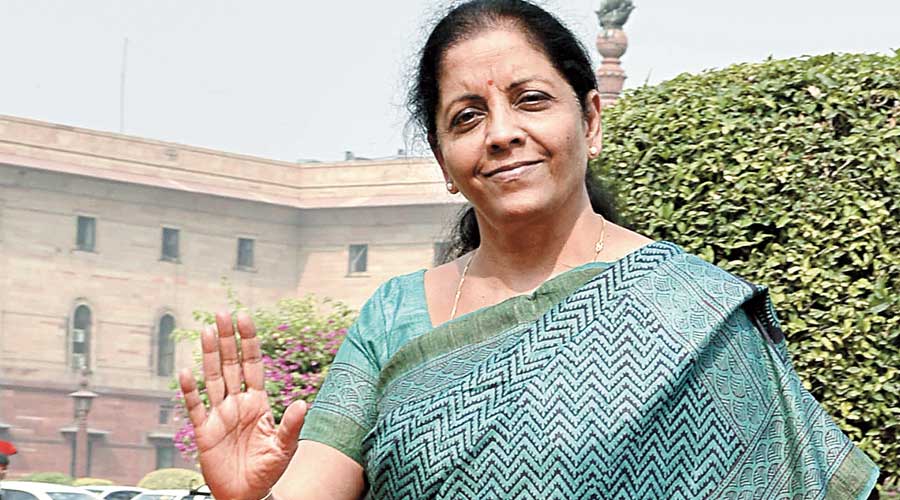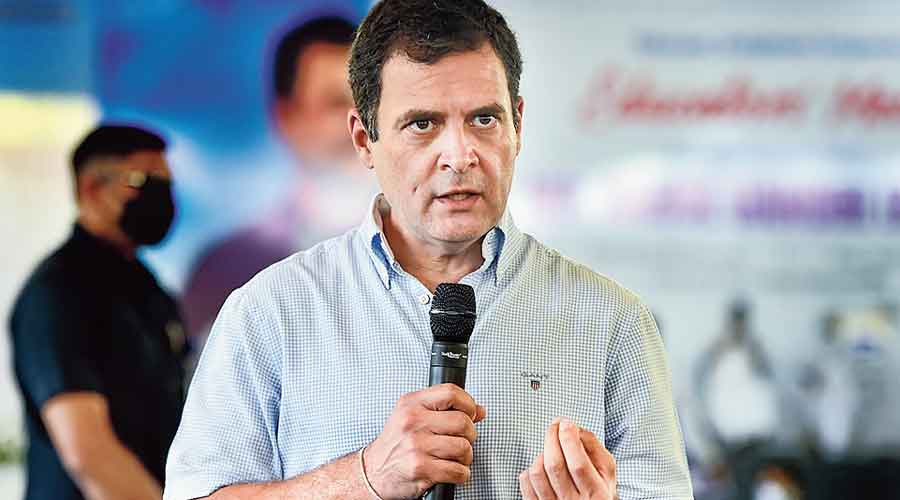The stage is set for a stormy Budget Session of Parliament that begins on Monday with the opposition set to target the Modi government on issues such as the Pegasus snooping row, farm distress and Chinese "incursions" in eastern Ladakh.
The session will begin with President Ram Nath Kovind's address to the Lok Sabha and Rajya Sabha assembled together in the Central Hall and chambers of both the Houses in view of the COVID-19 situation.
Finance Minister Nirmala Sitharaman will present the Economic Survey 2021-22 on Monday and the Union Budget on Tuesday. Given the ongoing third wave of the pandemic, the Lok Sabha and Rajya Sabha will return to have separate sittings in shifts with members seated across both chambers of Parliament to ensure distancing norms.
The Lok Sabha will take up the discussion on the Motion of Thanks on the President's Address from Wednesday and Prime Minister Narendra Modi is expected to reply to the debate on February seven.
Lok Sabha secretariat officials said four days beginning February 2 have been provisionally allotted for the discussion on the Motion of Thanks on the President's Address.
The first part of the Budget Session will be held from January 31 to February 11 after which it will go into recess to examine the budgetary allocations for different departments.
The Session would resume on March 14 and conclude on April 8. The Budget Session is taking place amid a heated election campaign in five states Uttar Pradesh, Uttarakhand, Punjab, Goa, and Manipur - which go to polls in seven phases from February 10 to March 7.
The main Opposition Congress has declared that it will reach out to like-minded parties to raise issues such as farm distress, Chinese "incursions", demand for relief package for COVID-19 victims, sale of Air India and the Pegasus snooping row during the session.
Parliamentary Affairs Minister Pralhad Joshi and Rajya Sabha Chairman M Venkaiah Naidu are set to chair separate meetings with floor leaders of political parties on Monday to ensure smooth functioning of the House during the session.
Budget expectations: Clarity on crypto taxation, hike in 80C limit, duty rationalisation on EVs

Union Finance Minister Nirmala Sitharaman File :Picture
As Finance Minister Nirmala Sitharaman presents her fourth Union Budget on February 1 all eyes would be on how the government balances out populist measures while walking the tightrope of fiscal consolidation.
While Indian corporates are expecting some key announcements which will enable them to reset their growth agenda, individual taxpayers are expecting some more disposable income in their hands to invest and consume more.
As India works towards a USD 5 trillion economy by 2025, and with just 2 days to go for 2022-23 Budget, here are the top five market expectations on direct and indirect taxes.
DIRECT TAXES:
1. 80C deduction available up to Rs 1.5 lakh a year be revised upwards significantly;
2. To make the optional concessionary tax regime, which came into effect from April 2021, more acceptable, raise the threshold Rs 15 lakh income for laying peak 30% tax rate;
3. As Web 3.0 unfolds, crypto assets encompassing a wide array of digital assets like non fungible tokens, wrapped asset token etc, will gain tremendous traction. it is being expected that a specialised regime for taxation of cryptocurrency will be introduced in the budget.
4. The burden of the long-term capital gains tax (LTCG), introduced vide Finance Act 2018, has somewhat dented investor confidence. Major economies do not have LTCG tax. In India too, it is expected that LTCG on the sale of Indian-listed equity shares will be exempted as it would boost investment through the stock exchange.
5. Corporates are expecting that the entire amount, or an appropriate proportion of expenditure incurred for helping the society and employee welfare during COVID-19 will be allowed as deductible expenditure. Also, the government is expected to reduce the tax rates for companies engaged in R&D activities to 15 per cent or less and allow weighted deduction on in-house R&D expenditure.
INDIRECT TAXES:
1. Rationalisation of Customs duty structure for EV and ancillary components, renewable energy generation devices and related components is likely.
2. Sector specific concessions for semi-conductor manufacturers with focus on exports is expected.
3. Budget allocations for the expansion of the PLI scheme for sectors such as leather and laminates; additional incentive schemes will also lure companies into setting up additional manufacturing in sectors that were not the focus in previous budgets and help reverse the impact of the pandemic.
4. The government is already reviewing 400 customs duty exemptions (as announced in the previous budget). The final list is expected to be proposed as part of the 2022 budget and industry is awaiting it so that there is no adverse impact on trade as a result of this exercise. 5. Extension of customs duty exemption on goods imported for testing, and setting up of a customs dispute resolution forum, ease compliances under customs, and integration of the current ICEGATE, DGFT and SEZ online portal into a common digital platform.
EXPERTS TAKE:
Nangia Andersen India Chairman Rakesh Nangia said notably, the top end of businesses as well as the upper middle class is doing sufficiently well, despite the indelible impact left by the covid crisis.
"India is witnessing real consumption problem as the less affluent segments have still not come out of their distressed situations. The budget's key focus must be to enable the ecosystem around job, income, and demand creation. There is also a need to address various challenges including the most important consideration viz. data protection faced by relatively newer sectors like telemedicine, tele lawyering and ed-tech," Nangia said.
Deloitte India Partner Gokul Chaudhri said the budget is expected to provide relief to lower and middle-income earners with disposable income impacted due to inflation.
Also, India has agreed to do away with equalisation levy (EL) and follow the multilateral solution in the form of Pillar 1 and 2 agreed between 137 member countries working at the OECD Inclusive Framework.
"It is expected that the budget will introduce necessary legislative framework to facilitate implementation of these and also lay down a road map for stakeholder consultation," Chaudhri added.
AMRG & Associates Senior Partner Rajat Mohan said while middle class expects higher disposal income to counter intensifying inflation, large corporates anticipate stability in tax structure, MSME desires availability of extra liquidity to fund business growth, and foreign investors expect a conducive business environment for long-term strategic investments from Budget 2022-23.
Nangia Andersen LLP Partner-Indirect Tax Samir Kapadia said if the Government earnestly wants to promote India as a manufacturing hub and pursue the policy of Atma Nirbhar Bharat, then the Government needs to take some pragmatic measures.
"These measures, among other things may require, rationalizing the rate of primary inputs /intermediaries one hand; and on the other hand, increase the rate of finished products to provide a tariff protection to promote domestic manufacturing in India," Kapadia added.
Dhruva Advisors LLP Partner Sandeep Bhalla said the Media and Entertainment sector requires mammoth investments in digitisation, technology set up and distribution network.










